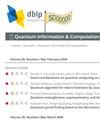一个更简单的六态量子密钥分发安全性证明
IF 0.7
4区 物理与天体物理
Q3 COMPUTER SCIENCE, THEORY & METHODS
引用次数: 0
摘要
在基于量子比特的量子密钥分发方案中,六态量子密钥分发(QKD)实现了最高的密钥速率。自2005年以来开发的标准安全性证明调用了涉及光滑R\ {e}nyi熵的复杂定理。在本文中,我们提出了一个更简单的六态QKD安全性证明,它完全避免了R\ {e}nyi熵。这是通过在贝尔基中直接应用状态平滑来实现的。我们得到了众所周知的渐近速率,但有稍微有利的有限大小项。我们进一步证明了同样的证明技术可以用于六态量子密钥的回收。本文章由计算机程序翻译,如有差异,请以英文原文为准。
A simpler security proof for 6-state quantum key distribution
Six-state Quantum Key Distribution (QKD) achieves the highest key rate in the class of qubit-based QKD schemes. The standard security proof, which has been developed since 2005, invokes complicated theorems involving smooth R\'{e}nyi entropies. In this paper we present a simpler security proof for 6-state QKD that entirely avoids R\'{e}nyi entropies. This is achieved by applying state smoothing directly in the Bell basis. We obtain the well known asymptotic rate, but with slightly more favorable finite-size terms. We furthermore show that the same proof technique can be used for 6-state quantum key recycling.
求助全文
通过发布文献求助,成功后即可免费获取论文全文。
去求助
来源期刊

Quantum Information & Computation
物理-计算机:理论方法
CiteScore
1.70
自引率
0.00%
发文量
42
审稿时长
3.3 months
期刊介绍:
Quantum Information & Computation provides a forum for distribution of information in all areas of quantum information processing. Original articles, survey articles, reviews, tutorials, perspectives, and correspondences are all welcome. Computer science, physics and mathematics are covered. Both theory and experiments are included. Illustrative subjects include quantum algorithms, quantum information theory, quantum complexity theory, quantum cryptology, quantum communication and measurements, proposals and experiments on the implementation of quantum computation, communications, and entanglement in all areas of science including ion traps, cavity QED, photons, nuclear magnetic resonance, and solid-state proposals.
 求助内容:
求助内容: 应助结果提醒方式:
应助结果提醒方式:


